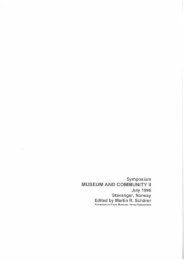Key Concepts of Museology - ICOM
Key Concepts of Museology - ICOM
Key Concepts of Museology - ICOM
Create successful ePaper yourself
Turn your PDF publications into a flip-book with our unique Google optimized e-Paper software.
RESEARCH<br />
n. – Equivalent in French: recherche; Spanish:<br />
investigación; German: Forschung; Italian:<br />
ricerca; Portuguese: pesquisa, investigaçāo.<br />
Research consists <strong>of</strong> exploring predefi<br />
ned fi elds with the purpose <strong>of</strong><br />
advancing the knowledge <strong>of</strong> these<br />
and the action it is possible to carry<br />
out in these fi elds. In the museum,<br />
research consists <strong>of</strong> the intellectual<br />
activities and work aimed at discovery,<br />
invention, and the advancement<br />
<strong>of</strong> new knowledge connected with<br />
the museum collections, or the activities<br />
it carries out.<br />
1. Until 2007 <strong>ICOM</strong> presented<br />
research in the French (and <strong>of</strong>fi -<br />
cial) version <strong>of</strong> the defi nition <strong>of</strong><br />
museum, as the driving force behind<br />
its functioning, the objective <strong>of</strong> the<br />
museum being to carry out research<br />
on the material evidence <strong>of</strong> man and<br />
society, which is why the museum<br />
“acquires, conserves, and exhibits”<br />
this evidence. This formal defi nition<br />
which presented the museum<br />
as a kind <strong>of</strong> laboratory (open to the<br />
public) no longer represents museal<br />
reality today, since a large part <strong>of</strong><br />
the research such as was carried out<br />
in the last third <strong>of</strong> the 20 th century<br />
has been moved from museums to<br />
laboratories and universities. Now<br />
R<br />
the museum “acquires, conserves,<br />
researches, communicates and exhibits<br />
the tangible and intangible heritage<br />
<strong>of</strong> humanity” (<strong>ICOM</strong>, 2007).<br />
This defi nition, shorter than the<br />
previous one (and with the term “fait<br />
des recherches” [does research] in<br />
French replaced by “étudier” [study])<br />
nonetheless remains essential to the<br />
general operations <strong>of</strong> the museum.<br />
Research is one <strong>of</strong> the three activities<br />
<strong>of</strong> the PRC model (Preservation<br />
– Research – Communication) proposed<br />
by the Reinwardt Academie<br />
(Mensch, 1992) to defi ne the functioning<br />
<strong>of</strong> museums; it appears to be<br />
a fundamental element for thinkers<br />
as different as Zbyněk Stránský or<br />
Georges Henri Rivière, and many<br />
other museologists from central and<br />
eastern Europe, such as Klaus Schreiner.<br />
At the Musée national des Arts<br />
et traditions populaires (The National<br />
Museum <strong>of</strong> Folk Arts and Traditions),<br />
and more precisely through<br />
his works on l’Aubrac, Rivière perfectly<br />
illustrated the repercussions<br />
<strong>of</strong> the scientifi c research programme<br />
for all the functions <strong>of</strong> a museum, in<br />
particular its acquisition, publication<br />
and exhibition policies.<br />
2. Aided by market mechanisms<br />
which have favoured temporary<br />
exhibitions to the detriment <strong>of</strong> per-<br />
73
















